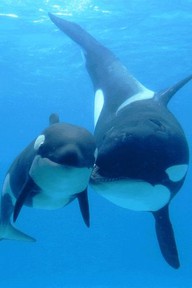And apple pie

Via Science 2.0:
Marine biologists have determined that male killer whales have an apron strings problem. It turns out female killer whales have the second-longest life after menopause of any mammal, exceeded slightly by human beings. A nagging question for biologists is why whales can live as long as 90 years but stop having offspring at 40 or 50 — a mirror of human patterns. Most animal life spans extend only slightly beyond reproductive viability (or, less).
A team representing the universities of York and Exeter in England, the Pacific Biological Station in Canada, and the American Center for Whale Research, studied over three decades of mortality statistics for orcas in the north Pacific. They determined adult male orcas up to middle age were much more likely to die in the first year after their mothers’ deaths. Per Science 2.0, the data crunching revealed male orcas deeply affected by mom’s passing, while females soldiered on no worse for the wear:
In the case of males over the age of 30, a mother’s death meant a 14-fold increase in the likelihood of their death within a year. Females also stay within their mother’s group but for daughters of the same age, the difference is just under three-fold. For females under the age of 30, the death of their mothers had no effect on their survival rates.
What’s particularly curious about the finding is the comparison with humanity. Human menopause appears to exist to create the category “grandma” — even homo habilus could use the help of someone with childcare experience, an affinity for a particular small kid, and none of her own to divide attention.
Killer whales, however, appear to have evolved menopause not so mom can lend a fin with the grandkids, but so she never stops looking after her own son. The evolutionary incentive appears to relate to how killer whale society is organized, with young females of the pod caring for the offspring, and mature females accompanying their sons as they tomcat around, increasing genetic variation. Well into his thirties, the male still needs his mother to ensure his viability, and the mother dedicates her life to providing it.
It is tempting to judge. But we’ve met other families like that.



